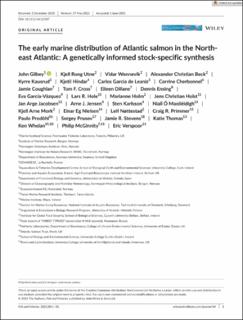The early marine distribution of Atlantic salmon in the North-east Atlantic: A genetically informed stock-specific synthesis
| dc.contributor.author | Gilbey, John | |
| dc.contributor.author | Utne, Kjell Rong | |
| dc.contributor.author | Wennevik, Vidar | |
| dc.contributor.author | Beck, Alexander Christian | |
| dc.contributor.author | Kausrud, Kyrre Linné | |
| dc.contributor.author | Hindar, Kjetil | |
| dc.contributor.author | de Leaniz, Carlos Garcia | |
| dc.contributor.author | Cherbonnel, Corrine | |
| dc.contributor.author | Coughlan, Jamie | |
| dc.contributor.author | Cross, Tom F. | |
| dc.contributor.author | Dillane, Eileen | |
| dc.contributor.author | Ensing, Dennis | |
| dc.contributor.author | García-Vázquez, Eva | |
| dc.contributor.author | Hole, Lars Robert | |
| dc.contributor.author | Holm, Marianne | |
| dc.contributor.author | Holst, Jens Christian | |
| dc.contributor.author | Jacobsen, Jan Arge | |
| dc.contributor.author | Jensen, Arne Johan | |
| dc.contributor.author | Karlsson, Sten | |
| dc.contributor.author | Ó Maoiléidigh, Niall | |
| dc.contributor.author | Mork, Kjell Arne | |
| dc.contributor.author | Nielsen, Einar Eg | |
| dc.contributor.author | Nøttestad, Leif | |
| dc.contributor.author | Primmer, Craig R. | |
| dc.contributor.author | Prodöhl, Paulo | |
| dc.contributor.author | Prusov, Sergey | |
| dc.contributor.author | Stevens, Jamie R. | |
| dc.contributor.author | Thomas, Katie | |
| dc.contributor.author | Whelan, Ken | |
| dc.contributor.author | McGinnity, Philip | |
| dc.contributor.author | Verspoor, Eric | |
| dc.date.accessioned | 2021-10-19T07:51:52Z | |
| dc.date.available | 2021-10-19T07:51:52Z | |
| dc.date.created | 2021-08-02T09:42:09Z | |
| dc.date.issued | 2021 | |
| dc.identifier.citation | Fish and Fisheries. 2021, . | en_US |
| dc.identifier.issn | 1467-2960 | |
| dc.identifier.uri | https://hdl.handle.net/11250/2823791 | |
| dc.description.abstract | The survival of Atlantic salmon (Salmo salar), an increasingly rare anadromous species, has declined dramatically during its marine phase, with disproportionate impacts on the poorly understood early post-smolt period. Logistical constraints on collecting oceanic data to inform this issue pose a formidable obstacle. To advance understanding of post-smolt distributional ecology in the North-east Atlantic, a comprehensive analysis of existing information was undertaken. Data were synthesized from 385 marine cruises, 10,202 individual trawls, and 9,269 captured post-smolts, spanning three decades and ~4.75 million km2 of ocean, with 3,423 individuals genetically assigned to regional phylogeographic origin. The findings confirm major migrational post-smolt aggregations on the continental shelf-edge off Ireland, Scotland and Norway, and an important marine foraging area in the Norwegian Sea. Genetic analysis shows that aggregational stock composition does not simply reflect distance to natal rivers, with northern phylogeographic stock groups significantly under-represented in sampled high-seas aggregations. It identifies a key foraging habitat for southern European post-smolts located in international waters immediately west of the Vøring Plateau escarpment, potentially exposing them to a high by-catch mortality from extra-territorial pelagic fisheries. Evidence of the differential distribution of regional stocks points to fundamental differences in their migration behaviours and may lead to inter-stock variation in responses to environmental change and marine survival. The study shows that understanding of post-smolt marine ecology, as regards to stock-specific variations in habitat utilization, biological performance and exposure to mortality factors, can be significantly advanced by data integration across studies and exploiting genetic approaches. | en_US |
| dc.language.iso | eng | en_US |
| dc.title | The early marine distribution of Atlantic salmon in the North-east Atlantic: A genetically informed stock-specific synthesis | en_US |
| dc.type | Peer reviewed | en_US |
| dc.type | Journal article | en_US |
| dc.description.version | publishedVersion | en_US |
| dc.source.pagenumber | 33 | en_US |
| dc.source.journal | Fish and Fisheries | en_US |
| dc.identifier.doi | 10.1111/faf.12587 | |
| dc.identifier.cristin | 1923304 | |
| dc.relation.project | EC/FP7/212529 | en_US |
| dc.relation.project | Norges forskningsråd: 280308 | en_US |
| dc.relation.project | Meteorologisk institutt: 181090 | en_US |
| cristin.ispublished | true | |
| cristin.fulltext | original | |
| cristin.qualitycode | 2 |
Tilhørende fil(er)
Denne innførselen finnes i følgende samling(er)
-
Articles [3016]
-
Publikasjoner fra CRIStin [3074]
